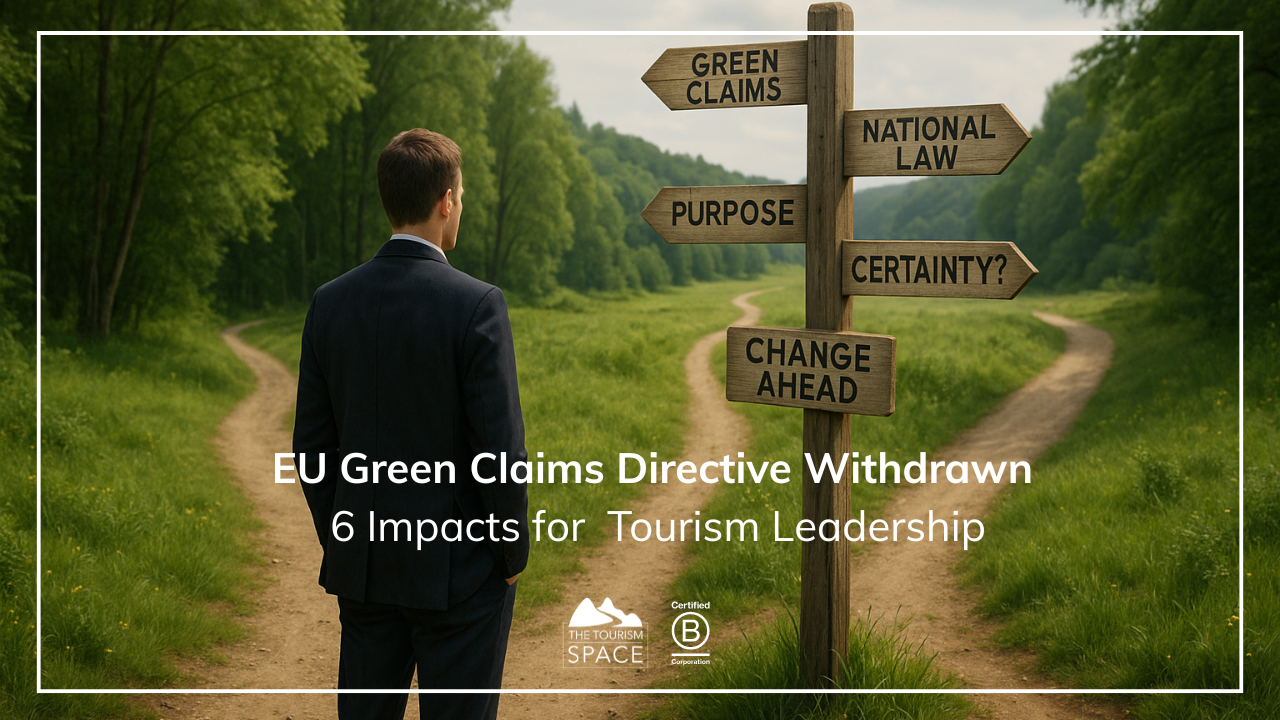
EU Green Claims Directive Withdrawn : 6 Impacts for Tourism Leadership
The approval of the EU Green Claims Directive last year created ripples of anxiety in
the sustainable tourism space. Its surprise withdrawal this month, just ten days ago,
has arguably created even more.
For those working in or with public sector tourism, the proposed directive added yet
another layer to an already complex and fast-evolving regulatory landscape. Its
withdrawal removes one challenge and introduces others.
At The Tourism Space, we’ve spent the past year helping public sector teams
understand what the directive might have meant for them and their destinations.
While its ambition to tackle greenwashing was welcome, the approach risked being
costly, confusing, and potentially counterproductive, especially for small and medium
providers and the agencies supporting them.
Now, the policy landscape shifts again. Here’s what the withdrawal does, and does
not, mean for public sector leaders seeking to navigate sustainability, storytelling,
and compliance in a changing Europe.
1. The Complexity and Fragmentation Remains
The directive was intended to create a harmonised, EU-wide framework for
substantiating environmental claims, reducing greenwashing and providing clear
rules for businesses. Its withdrawal leaves a regulatory gap, meaning sustainable
tourism policies may now rely more on national laws and existing directives such as
the Unfair Commercial Practices Directive (UCPD) and the Consumer Rights
Directive. This could lead to inconsistency in how sustainability claims are regulated
and enforced across member states. For public sector professionals, this means
more interpretation rather than less. While the immediate burden may have eased,
the underlying responsibility remains. In some ways, it has become more
ambiguous.
2. Green Claims Still Require Evidence
Despite the withdrawal, businesses in the tourism sector must still ensure that their
environmental claims are truthful, clear, and substantiated. The UCPD and the
Empowering Consumers for the Green Transition Directive (ECGT) continue to ban
vague or misleading claims and require transparency, so companies cannot simply
make unverified green statements without risk of enforcement. This suggests a
continued, if not increased, need for support. Public sector agencies will likely remain
the go-to source for local businesses seeking clarity and credibility in a values-led
marketplace.
3. Certification Confusion Will Continue
The directive’s withdrawal may slow the consolidation and standardisation of
Sustainability certification schemes in tourism. Many certifiers and businesses were
preparing for stricter, EU-recognised verification requirements. Now, there is
uncertainty about which schemes will be considered credible at an EU level,
potentially leading to the continued proliferation of less robust certifications and
confusion for both businesses and consumers
This presents a challenge for public sector teams trying to recommend credible
options or support informed decisions. The absence of an EU benchmark may lead
to a proliferation of competing schemes, further confusing businesses and eroding
consumer trust.
4. The Risk of Greenhushing Remains
Some tourism businesses, wary of making claims they cannot fully substantiate or
facing inconsistent enforcement, may choose to “greenhush” i.e. to avoid making
sustainability claims altogether. This could result in genuinely sustainable businesses
stepping back from communicating their efforts, while less sustainable businesses
continue to dominate the market narrative. This imbalance matters. It’s often public sector teams who can help rebalance the conversation with steady guidance.
5. Public Sector Leadership Has Grown in Significance
With the EU framework withdrawn, national and local authorities will need to provide
clearer guidance and enforcement. This places additional pressure on public sector
tourism agencies to interpret and implement sustainable tourism policies in a fragmented regulatory environment. Absence of legislation does not allow absence of leadership.
6. There is more change ahead
The withdrawal is not the end of efforts to regulate green claims. The ECGT, which
amends the UPCD and Consumer Rights Directive, will impose new requirements
from 2026. A revised version of the directive could reappear in the next EU
legislative cycle. Meanwhile, some member states are innovating with their own
labelling and verification schemes. We are still in transition and not at a point of
conclusion.
Final Reflection: Leadership through Principles and Purpose
At The Tourism Space, we've always believed that transformation does not start with
compliance. It starts with principles and purpose inspired by and rooted in the place
itself. The most meaningful and enduring sustainability progress comes from places
and people working with conviction and care.
The withdrawal of the directive offers a chance to recalibrate. It was never an ideal
instrument to achieve the outcome it set out to achieve. Its withdrawal opens space
for localised, place-based leadership that is appropriate to each destination’s
context.

